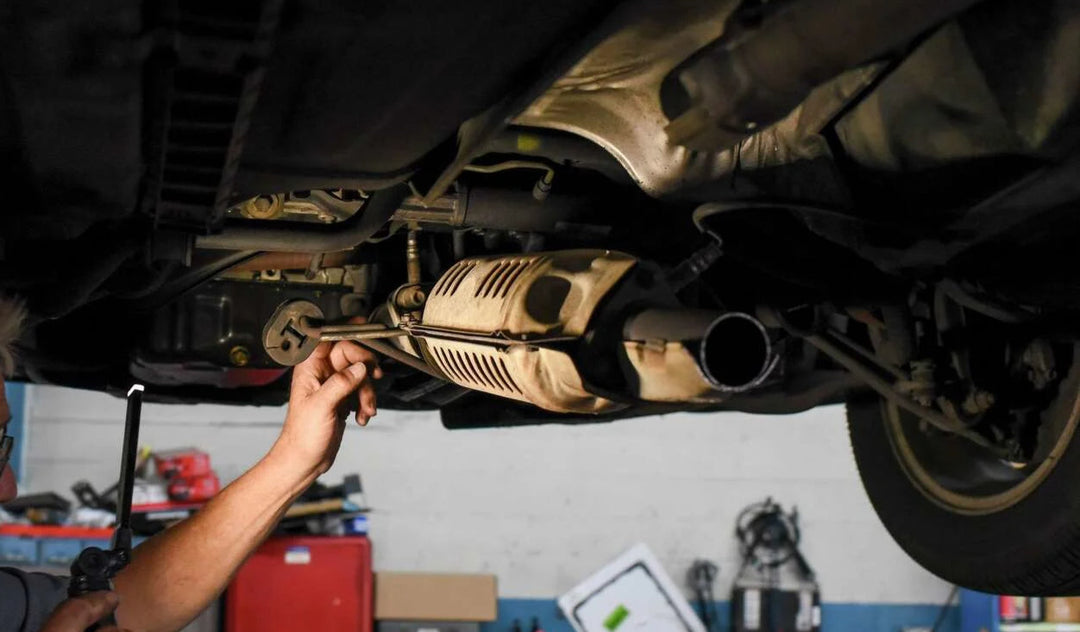Student Safety: Prevent Catalytic Converter Theft on Campuses
Catalytic converter theft is once again surging across the United States, and college campuses, once considered relatively safe, are becoming hotspots for this persistent type of vehicle crime. When thinking about campus safety, most parents worry about dorm security or late-night walks home. However, student safety must now also include protecting vehicles from catalytic converter theft.
Imagine sending your child off to college, only to receive a call that their car’s exhaust system has been sawed apart in broad daylight, leaving them with a $3,000 repair bill and no way to get to class. It is a parent’s nightmare and a student’s unwanted distraction. On top of tuition and textbooks, the last thing anyone needs is an expensive, stressful theft that could have been prevented.
Why Steal Catalytic Converters?
Catalytic converters, which are part of a car’s exhaust system, contain precious metals such as platinum, palladium, and rhodium. Thieves can remove a catalytic converter in under a minute and sell it for quick cash. A standard converter can bring anywhere from $300 to $800, while one from a hybrid vehicle can fetch up to $1,000 because hybrids and certain smaller-engine vehicles contain higher amounts of these valuable metals. The vehicle’s location does not matter; if it is a desirable model, a thief will take the opportunity. College students’ cars are attractive targets because of the types of vehicles they drive and where they have to park.
Connecting College Campuses & Catalytic Converter Theft
College campuses concentrate hundreds or even thousands of vehicles in relatively confined areas with limited security. Students on tight budgets often drive older, dependable, fuel-efficient cars, which are prime targets because their catalytic converters are rich in precious metals and relatively easy to steal.
Among the most commonly targeted vehicles that students are likely to drive are:
-
Toyota Corolla
-
Toyota Prius
-
Toyota Camry
-
Toyota Tacoma
-
Honda Civic
If you would like to know more about why these cars are top targets on college campuses and why students love them, you can read and share our blog post, Top 5 Student Cars at Risk of Catalytic Converter Theft.
Campus security and police cannot patrol every parking lot at all times. Large student parking areas, sprawling commuter lots, and multi-level garages provide thieves with plenty of hiding spots. Even with security cameras, a catalytic converter can be removed in 60 seconds or less, often faster than a student can walk to and from class.
Off-campus parking can be even riskier. Apartment complexes, side streets near coffee shops, gyms, and libraries often have no security patrols at all. For example, the University of Kentucky reported at least 26 catalytic converter thefts on campus in a short period despite increased lighting and camera installations. If criminals are bold enough to operate in a well-lit stadium lot, they will not hesitate to target quieter areas of campus. This makes catalytic converter theft prevention an important part of overall student safety and campus security awareness.
True Cost of a Stolen Catalytic Converter
Depending on the make and model, an OEM replacement catalytic converter can cost anywhere from $1,200 on the low end to upwards of $4,000 for parts and labor. Many victims report repair bills of around $2,000 for common models. Even with insurance, deductibles of $500 or $1,000 are common, and many students do not carry comprehensive coverage that includes theft, especially for older vehicles.
The financial cost is only one part of the problem. After a theft, the vehicle is often undriveable or unsafe until repaired, which can take one to three weeks depending on parts availability. Students must then arrange alternative transportation for classes, work, and other commitments, creating stress, delays, and disruptions.
The emotional impact can be equally damaging. Students often feel unsafe or violated, and parents may question whether their child is truly safe on campus if thefts occur in nearby parking areas. One concerned grandfather of a theft victim remarked, “Students come here with the expectation of getting a good education... and feeling safe. I don’t know how safe or unsafe they are now.”
Catalytic converter theft impacts victims financially, logistically, and emotionally, which makes proactive action not just essential but the only effective way to combat this type of crime. This is why we are committed to raising awareness and sharing prevention strategies with college students, parents, and school faculty across the country
Staying Informed About Your Vehicle’s Risk
Sending a child to college is a proud moment for parents, and no one should have to add “catalytic converter theft” to the list of concerns. Preventing this crime protects a student’s independence, their transportation, and their family’s finances.
Start by checking whether your car is a known target. If your vehicle appears on theft trend lists, it is at higher risk. Companies like Miller CAT, a leader in catalytic converter theft prevention, manufacture products like the Cat Shield specifically for models that have been repeatedly targeted. If a Cat Shield is available for your make and model, it is a glaring indication that you should install one as soon as possible before your student’s car become the next victim.
As the exclusive official partner and manufacturer of Toyota-associated Cat Shield products, Miller CAT ensures that every catalytic converter shield is designed to fit your vehicle precisely and perform exactly as intended.
A catalytic converter shield, guard, or cover is a durable metal barrier that bolts to the vehicle’s frame, blocking direct access to the converter. This approach forces thieves to spend more time and create more noise, greatly increasing their chances of being caught and in most cases thwarting the attempt altogether. Installing a Cat Shield is a one-time investment that can save thousands in repairs, eliminate the stress of dealing with theft, and provide lasting peace of mind.
Miller CAT also maintains a list of installers and dealerships that have purchased the Cat Shield, which can be found on their website to help you locate a professional for installation. Please note that these installers are not affiliated with or endorsed by Miller CAT. These listings are provided as a convenience to help locate potential installers, but customers should confirm qualifications, pricing, and experience before proceeding.
Final Message to Parents and Students
College should be a time for learning, growth, and building a sense of community, not dealing with police reports or paying for costly repairs in the middle of a semester. Yet catalytic converter theft is a real and growing problem that can disrupt a student’s education, independence, and a parents’ peace of mind.
By understanding the risks and taking proactive measures, parents and students can play a direct role in making campuses safer and reducing catalytic converter theft. Start by checking whether your vehicle is on the list of commonly targeted models. If it is, take steps to protect it with proven solutions, like the Cat Shield.
Protection is only part of the solution, and awareness is equally important. Share this knowledge with friends, classmates, and your campus community so more vehicles are protected and fewer students become victims. With the right combination of education, preparation, and prevention, we can make campus parking lots far less appealing to thieves.
When students are free from the stress and financial burden of theft, they can focus on what truly matters: their classes, their activities, and their future. A small step taken today could save thousands of dollars, countless hours, and a great deal of frustration tomorrow. By protecting your own vehicle and encouraging others to do the same, you help create a safer and more secure campus for everyone.
References
Caltech. (n.d.). Catalytic converters and precious metals. Retrieved from https://www.caltech.edu/
Carfax. (n.d.). Catalytic converter theft: What you need to know. Retrieved from https://www.carfax.com/
LEX18. (n.d.). University of Kentucky sees spike in catalytic converter thefts. Retrieved from https://www.lex18.com/





